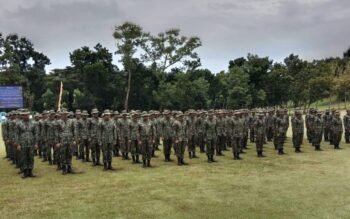DAVAO CITY (MindaNews / 3 February) – The development team of the Safe Davao QR (DQR) code is working to install a new feature in the system’s push notifications, which includes the date, time and place of a holder’s encounter with a coronavirus disease 2019 (COVID-19) patient, an official disclosed.
Lemuel Ortonio, Human Resource Management Office head who leads the implementation of the DQR system, said in an interview over Davao City Disaster Radio (DCDR 87.5) on Wednesday that the local government decided to add the new feature amid the clamor of the recipients of text messages sent via the DQR system to make known to them where and when they were exposed to a positive case.
“It’s being worked out by our development team, so that you, as an individual, will be aware where you have been exposed,” he added.
Ortonio did not discuss when the city plans to roll out this additional feature, but added that the local government pushed through the mandatory scanning of the DQR codes in offices and establishments, except at checkpoints, on February 3.
Section 2 of Executive Order 2 issued by Mayor Sara Duterte last January 22 provides that scanning is mandated to all individual offices and establishments, except for offices and establishments that are not enclosed or are not inside a structure with a roof and walls, such as milk tea stall, ambulant vendor, lechon manok stand, sari-sari store, bakery and palengke (market) stall.
Also, buildings that contain several offices or stores inside, such as malls, hospitals, and commercial complexes, don’t need to scan QR codes of individuals but, in such case, individual stores and offices should be the ones to do the scanning upon entry and exit of their customers and clients.
The DQR system is an electronic contact tracing and travel pass platform, intended to implement contactless gathering and electronic storage data within the city.
He said the city council will amend the DQR ordinance to prescribe additional penalties against non-compliant establishments.
Under the DQR ordinance passed on December 7, the DQR system must be used by all individuals, be they residents or non-residents, who need to enter the city for essential or work/business purposes. Establishments, covering government and private offices, event venues, hospitals, hotels, malls, stores, groceries, mini-marts, restaurants, carinderia, palengke, places of worship, educational institutions and all other organizations, including their sub-offices or branches, are also required to implement the system.
The ordinance penalizes individuals who take advantage of the DQR for “non-essential” purposes, for using cancelled DQR codes, or for refusing to present valid codes for scanning or inspection when so required by persons of authority.
Under the ordinance, first time-offenders will be penalized with a reprimand; a fine of P500 or community service, or both, for second time-offenders; and a fine of P1,500 or a month imprisonment, or both, for the third-time offenders.
The ordinance likewise prescribes the penalty of P500 for first offense, P1,000 for second offense, and P1,500 or one month imprisonment, or both, for third offense, for the following prohibited acts: lending of personal DQR to another person, use and possession of a fake DQR, use of a fake ID, birth certificate, and business registration number, or another individual’s ID or birth certificate or another’s business registration number to register for a DQR, making or selling fake identifies for DQR registration, and hacking of the DQR system and or identity theft.
It added that any person guilty of tampering or hacking the online link will be prosecuted for cybercrimes under Republic Act 10175 (Cybercrime Prevention Act) and any violations involving RA 10173 (Data Privacy Act).
The Task Force Davao, Davao City Police Office, City Health Office and barangay officials have been directed to strictly enforce the ordinance.
As of February 2, the Department of Health (DOH)-Davao Region reported 113 new cases, bringing the total cases to 17,593, with 2,820 active, 14,061 recoveries and 712 deaths.
Out of the total, Davao City, which reported the highest COVID-19 cases in Mindanao, tallied 11,790 cases, with 1,500 active, 9,736 recoveries and 554 deaths. Davao de Oro reported 940 cases, Davao del Norte with 2,514, Davao del Sur with 1,224, Davao Occidental with 199 and Davao Oriental with 926. (Antonio L. Colina IV / MindaNews)
